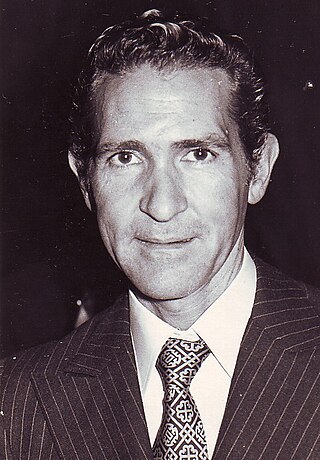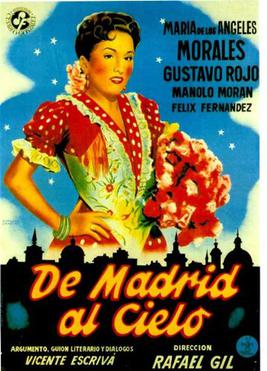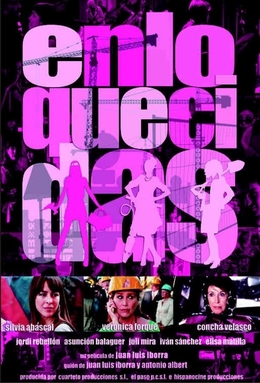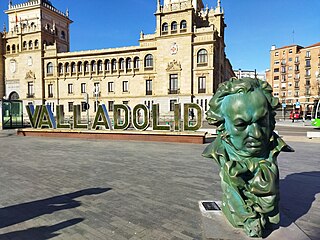Related Research Articles

Antonio Gala Velasco was a Spanish poet, playwright, novelist, and writer.

Rocío Espinosa López-Cepero, known professionally as Laura or Laurita Valenzuela, was a Spanish television presenter, actress and model. She was one of the first television presenters in Spain appearing in the early broadcasts of Televisión Española (TVE). In 1969, she hosted the Eurovision Song Contest held in Madrid.

Concepción Velasco Varona, known professionally as Concha Velasco, also Conchita Velasco, was a Spanish actress, singer, dancer, television presenter, and theatrical producer. She received numerous accolades throughout her career in film, theater, and television spanning over six decades, including two National Theater Awards presented by the Spanish Ministry of Culture in 1972 and 2016, the Lifetime Achievement Award presented by the Spanish Television Academy in 2009, and the Honorary Goya Award presented by the Spanish Film Academy in 2012.

Beatriz Pla Navarro better known as Beatriz Carvajal is a Spanish theatre, television and film actress.

Ángel de Andrés Miquel was a Spanish theatre actor and director.

CristóbalOudrid y Segura was a Spanish pianist, conductor, and composer. He is noted for his many contributions to the formation and development of the zarzuela genre in Spain during the second half of the 19th century. He was a gifted musician—but with little technical knowledge, which he bragged about to receive more credit from others with relation to his creations. This habit earned him the scathing criticism of people like Antonio Peña y Goñi who, nevertheless, praised the bright, sensual and cheerful ease with which Oudrid used to bring to life the true meaning of the Spanish song.
The Fair of the Dove is a 1963 Spanish musical comedy film directed by José Luis Sáenz de Heredia and starring Concha Velasco, Vicente Parra and Miguel Ligero. It is a remake of the film Paloma Fair.
Peace Never Comes is a 1960 Spanish drama film directed by León Klimovsky and starring Adolfo Marsillach, Concha Velasco and Carmen de Lirio. It is set in the years following the Spanish Civil War. A man uses his relationship with a former lover to infiltrate a group of Republican insurgents against Francoist Spain.

From Madrid to Heaven is a 1952 Spanish musical comedy film directed by Rafael Gil and starring María de los Ángeles Morales, Gustavo Rojo and Manolo Morán. It is set in early 20th-century Madrid. The film's sets were designed by the art director Enrique Alarcón.
The Reprieve is a 1961 Spanish drama film directed by José Luis Sáenz de Heredia and starring Pedro Armendáriz, Concha Velasco and Manuel Monroy.
Red Cross Girls is a 1958 Spanish film directed by Rafael J. Salvia. It is a musical romantic comedy.
Beyond the Garden is a 1996 Spanish drama film directed by Pedro Olea from a screenplay by Mario Camus, based on the novel of the same name by Antonio Gala. It stars Concha Velasco.
Yolanda Císcar Mateu, known professionally as Yolanda Ríos, was a Venezuelan–born Spanish actress best known for her appearances on the game show Un, dos, tres... responda otra vez and her theatrical performances.

Asunción Sánchez Abellán, known as Susi Sánchez, is a Spanish theater, film, and television actress.
This is a list of Spanish television related events from 1958.
The 21st Actors and Actresses Union Awards ceremony was held on 18 June 2012 at the Teatro Circo Price in Madrid. The gala was hosted by Yayo Cáceres.

Crazy is a 2007 Spanish comedy film directed by Juan Luis Iborra which stars Silvia Abascal, Verónica Forqué, and Concha Velasco alongside Jordi Rebellón, Asunción Balaguer, Juli Mira, Iván Sánchez, and Elisa Matilla.
The 14th Actors and Actresses Union Awards ceremony was held on 20 June 2005 at Madrid's Palacio de Congresos y Exposiciones. The gala was hosted by Concha Velasco and the comedy duo 'Quésquíspás'.
Carmen, Carmen is a Spanish musical written by Antonio Gala. It premiered in Madrid in 1988. It is based on the opera Carmen.

The 38th Goya Awards ceremony, presented by the Academy of Cinematographic Arts and Sciences of Spain, took place at the Feria de Valladolid premises in Valladolid, Castile and León on 10 February 2024. The ceremony was broadcast on La 1 and RTVE Play.
References
- 1 2 3 Romera Castillo, José (5 November 2011). Teatro español entre dos siglos a examen (in Spanish). Editorial Verbum, S.L. p. 170. ISBN 9788479627324.
- ↑ Torres, Rosana (1992-10-08). "Estreno triunfal de 'La truhana', de Antonio Gala, con Concha Velasco". El País (in Spanish). ISSN 1134-6582 . Retrieved 2023-05-22.
- ↑ Padilla Mangas, Ana (1993). ""La Truhana": un hito hacia la carnavalización en el teatro de Antonio Gala". Boletín de la Real Academia de Córdoba (124): 103, 106.
- ↑ La Truhana - Antonio Gala | PlanetadeLibros (in European Spanish).